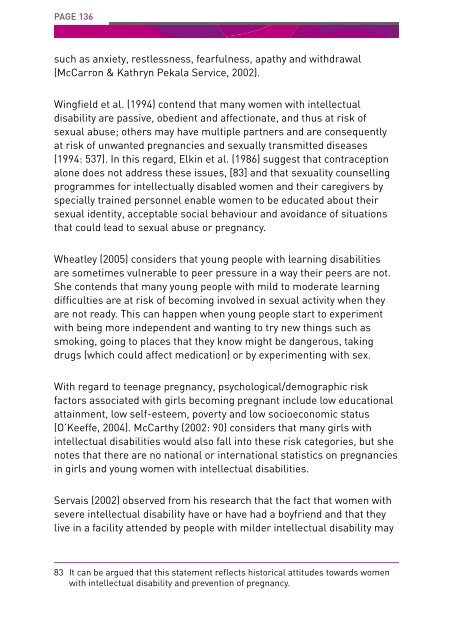Literature Review on Provision of Appropriate and Accessible ...
Literature Review on Provision of Appropriate and Accessible ...
Literature Review on Provision of Appropriate and Accessible ...
You also want an ePaper? Increase the reach of your titles
YUMPU automatically turns print PDFs into web optimized ePapers that Google loves.
PAGE 136<br />
such as anxiety, restlessness, fearfulness, apathy <strong>and</strong> withdrawal<br />
(McCarr<strong>on</strong> & Kathryn Pekala Service, 2002).<br />
Wingfield et <str<strong>on</strong>g>Literature</str<strong>on</strong>g> al. (1994) <str<strong>on</strong>g>Review</str<strong>on</strong>g> c<strong>on</strong>tend that Provisi<strong>on</strong> many <strong>of</strong> women <strong>Appropriate</strong> with <strong>and</strong> intellectual <strong>Accessible</strong><br />
Support to People with an Intellectual Disability who are<br />
disability are passive, obedient <strong>and</strong> affecti<strong>on</strong>ate, <strong>and</strong> thus at risk <strong>of</strong><br />
Experiencing Crisis Pregnancy<br />
sexual abuse; others may have multiple partners <strong>and</strong> are c<strong>on</strong>sequently<br />
at risk <strong>of</strong> unwanted pregnancies <strong>and</strong> sexually transmitted diseases<br />
(1994: 537). In this regard, Elkin et al. (1986) suggest that c<strong>on</strong>tracepti<strong>on</strong><br />
al<strong>on</strong>e does not address these issues, [83] <strong>and</strong> that sexuality counselling<br />
programmes for intellectually disabled women <strong>and</strong> their caregivers by<br />
specially trained pers<strong>on</strong>nel enable women to be educated about their<br />
sexual identity, acceptable social behaviour <strong>and</strong> avoidance <strong>of</strong> situati<strong>on</strong>s<br />
that could lead to sexual abuse or pregnancy.<br />
Wheatley (2005) c<strong>on</strong>siders that young people with learning disabilities<br />
are sometimes vulnerable to peer pressure in a way their peers are not.<br />
She c<strong>on</strong>tends that many young people with mild to moderate learning<br />
difficulties are at risk <strong>of</strong> becoming involved in sexual activity when they<br />
are not ready. This can happen when young people start to experiment<br />
with being more independent <strong>and</strong> wanting to try new things such as<br />
smoking, going to places that they know might be dangerous, taking<br />
drugs (which could affect medicati<strong>on</strong>) or by experimenting with sex.<br />
With regard to teenage pregnancy, psychological/demographic risk<br />
factors associated with girls becoming pregnant include low educati<strong>on</strong>al<br />
attainment, low self-esteem, poverty <strong>and</strong> low socioec<strong>on</strong>omic status<br />
(O’Keeffe, 2004). McCarthy (2002: 90) c<strong>on</strong>siders that many girls with<br />
intellectual disabilities would also fall into these risk categories, but she<br />
notes that there are no nati<strong>on</strong>al or internati<strong>on</strong>al statistics <strong>on</strong> pregnancies<br />
in girls <strong>and</strong> young women with intellectual disabilities.<br />
Servais (2002) observed from his research that the fact that women with<br />
severe intellectual disability have or have had a boyfriend <strong>and</strong> that they<br />
live in a facility attended by people with milder intellectual disability may<br />
83 It can be argued that this statement reflects historical attitudes towards women<br />
with intellectual disability <strong>and</strong> preventi<strong>on</strong> <strong>of</strong> pregnancy.
















